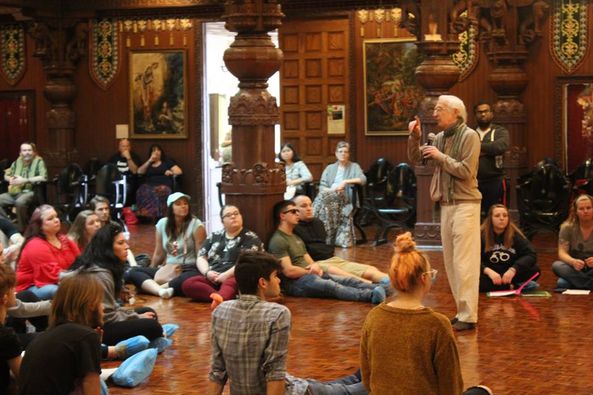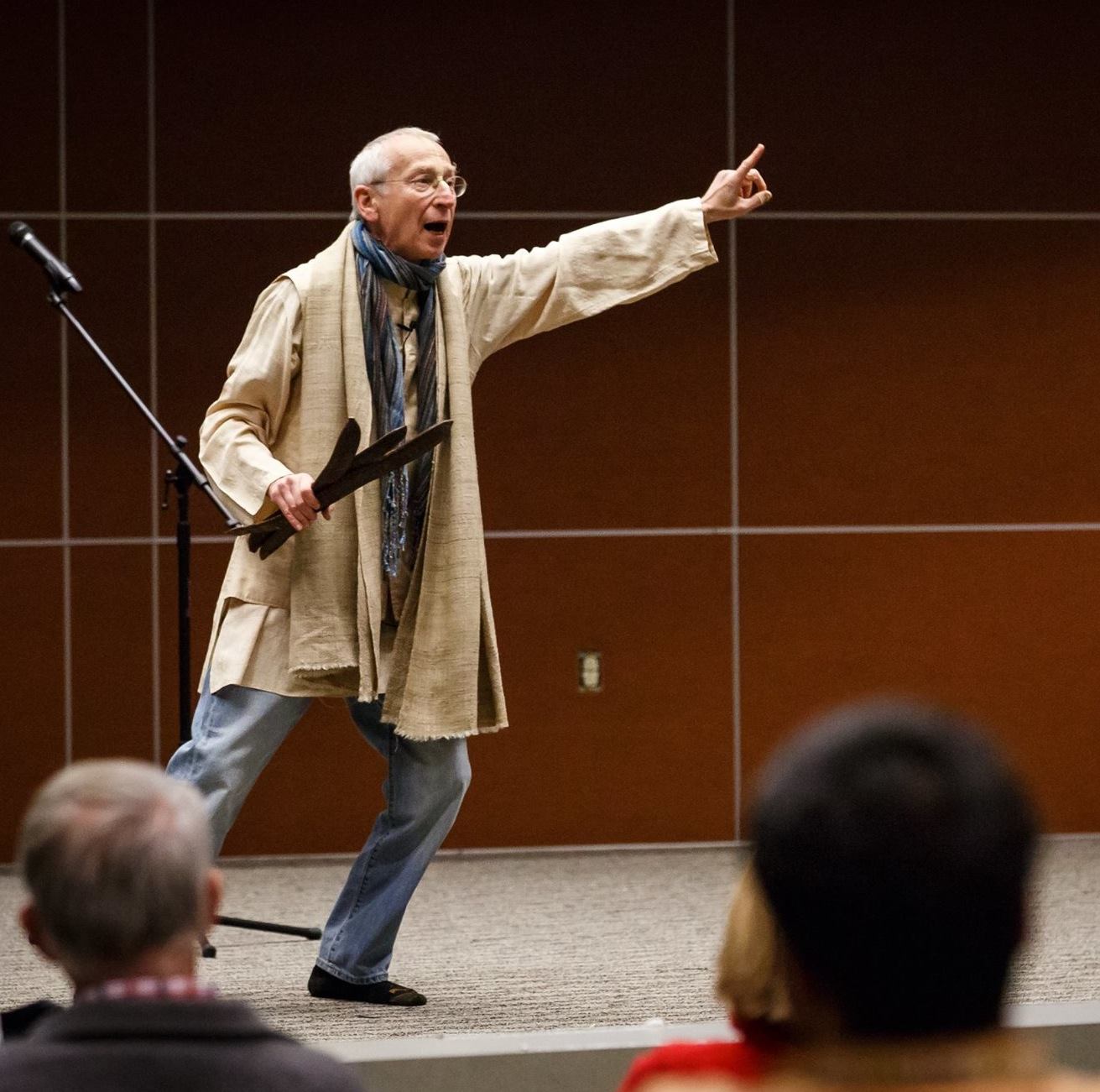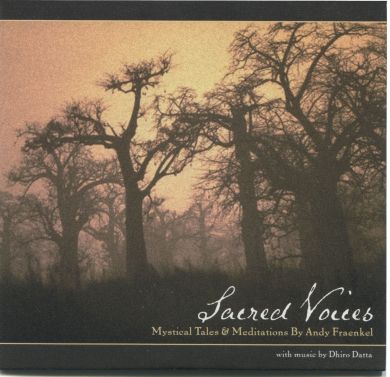Building Bridges For Krishna – An Interview with Sankirtana Das
By ISKCON News | Mar 10, 2024

Sankirtana Das giving a tour to a college group visiting New Vrindaban in West Virginia.
Sankirtana Das (Andy Fraenkel), a disciple of Srila Prabhupada and contributor to ISKCON News, has recently received a Storytelling World Resource Award for his CD Sacred Voices. An ISKCON News (IN) interview with Sankirtana Das (Skd) learns more about the honor and his thoughts on art, theater, sacred storytelling, interfaith dialogue, and more.
IN: Your storytelling CD, Sacred Voices, recently received an award from Storytelling World. What is Storytelling World?
Skd: Storytelling World was created and run by Dr. Flora Joy, a professor of Storytelling at East Tennessee State University. She produced a magazine called Storytelling World and also offered annual awards for 25 years to storytellers for their exceptional audio CDs and books. The magazine ceased publication a few years back, and now that she retired, this was the last year for the awards.
IN: And you received an award for Sacred Voices. Congratulations. Can you tell us about the idea behind Sacred Voices?
Skd: The idea came to me over 30 years ago. I heard about the National Storytelling Network and that many folks who were storytellers actually made a living at their craft. I decided to develop a repertoire to take around to schools, colleges, libraries, and various special events. One of the programs I developed was a collection of stories, poems, and meditations from a variety of sacred traditions. It would be a pilgrimage into the world’s sacred teachings through storytelling. I wanted to show how, even though they all have their own flavor, the essence and goal of the spiritual teachings are the same. It’s like going into an ice cream shop. That’s how Sacred Voices came about.
IN: And you performed the stories?
Skd: Yes. My background and training are in theater—performing and directing. I majored in theater in college, and shortly after I moved to New Vrindaban in 1976, I developed a theater project there. In the early 1990s, I transitioned from theater to storytelling. Doing a dramatic storytelling program is a bit like performing a play, but I didn’t have to worry about make-up, props, or costumes. It’s a solo presentation. It was a big relief for me.
IN: And how was the program received?
Skd: People really enjoyed Sacred Voices. A professor at one college came up afterwards and said, “You presented each story and poem with such passion and devotion, it seems like you’re connected to all these traditions.” Her comment was so wonderful and validating. Then, in early 1993, I heard about the Parliament of the World’s Religions. The original conference was in 1893 in Chicago, and they were planning a grand centennial event for 1993. So I contacted them, and they were interested and invited me almost immediately. I did a performance and a workshop session for them.
IN: It seems that Lord Krishna was helping you along.
Skd: Yes. Krishna is certainly kind to me. And several years later I had the opportunity to make a recording. One devotee, Dhirodatta prabhu, stopped in New Vrindaban with his portable recording studio. We recorded Sacred Voices in no time, and amazingly enough, he also created the musical accompaniment for each selection. By Krishna’s grace, it all fell together without me having to do very much. The thing is this: for years, I’ve been interested in interfaith dialogue and comparative religious studies. And when Prabhupada explained the Bhagavada gita and Krishna Consciousness, that we are each an eternal soul with an eternal relationship to Krishna, I thought, “This is the essence of all religions – to develop our love for God.” So my wife and I chanted and studied Prabhupada’s books for a few years, and finally, we joined the Movement in 1973.
- Performance at the University of Cincinnati, photo by Amy Smethurst.
- Sacred Voices CD cover.
IN: So, how were you able to use those interests?
Skd: Well, after we joined, I had the chance to attend a couple of interfaith conferences as a representative of ISKCON. I felt the movement needed to create bridges to help the American public get a better understanding of Krishna Consciousness. From the outside, our Movement looks pretty confusing. For me, interfaith dialogue, theater, and sacred storytelling were bridges that I could help build, at least for those people who had the same interests as I did.
In the 1980s, Prabhupada’s book, Light of the Bhagavata, was published. It’s a small book but a fascinating read. One part in verse six jumped out at me, “Hindus, Muslims, Christians, and the members of the other sects that have convincing faith in the authority of God must not sit idly now and silently watch the rapid growth of a godless civilization…The warning is already there, and responsible leaders of religious sects must meet together and form a common platform of a league of devotees of the Lord.”
And I was happy to discover many more quotes by Prabhupada. I’ll supply you with two:
“I don’t say that you have to come to this platform and accept Kṛṣṇa as God and no other. No. I don’t say. I say, ‘Please obey God. Please try to love God.’ That is my mission. And I give the way how to love God very easily.” – Interview on December 30, 1968, Los Angeles, CA
“Sa vai puṁsāṁ paro dharmo yato bhaktir adhokṣaje (SB 1.2.6): That is first-class religious system by which the followers become a lover of God. This is our formula. Either you go through Christianism or Hinduism or Muslimism. If you understand what is God and if you know what is your relationship with God—in this way your goal of life how to learn to love God, that is achieved—then it doesn’t matter through which religion you achieve that perfection.” – La Trobe University Lecture, July 1, 1974, Melbourne, Australia
And also a quote from Bhaktivinoda Thakur, the 19th-century saint and poet, from his Gitavali: “There exist a number of authentic ways to worship God, according to the customs of various peoples living in different countries. Some people worship the Lord in an untidy or careless manner; some worship Him by bending down on their knees; still others close their eyes while worshiping His impersonal Brahman aspect. Some people worship Him by assuming various yoga postures, and some immerse themselves in the congregational chanting of the Lord’s holy names, but all of them worship that one and only supreme treasure – Lord Sri Krsna.”
IN: Thank you for sharing these quotes and this interesting journey of yours.
Skd: And thank you. I want to mention one last thing. It’s very satisfying to feel that, in some way, we can help move Prabhupada’s mission forward. And as much as we need to make bridges outward to the public, we also need to make inward bridges. That means we need to take a look at how we can become more absorbed and more stable in our devotional lives. We all have our own unique propensities, interests, and resources, our sva-dharma, that we can tap into. When we connect to these things, we can make a more personal offering in service to the devotees, to guru, and to Krishna.
For more information about Sankirtana Das’ books, CDs, and presentations, please visit www.Mahabharata-Project.com Over the years, he has made presentations at the International Conference Revisiting the Indus-Sarasvati Age (1996), Religious Communications Congress (2000), Dharma Conference (2003), the National Storytelling Conference and FBI Unity Day (both in 2006). More recently, Sankirtana is working on a new book and also offers special guided tours for groups to New Vrindaban in West Virginia, where he resides with his wife.
















